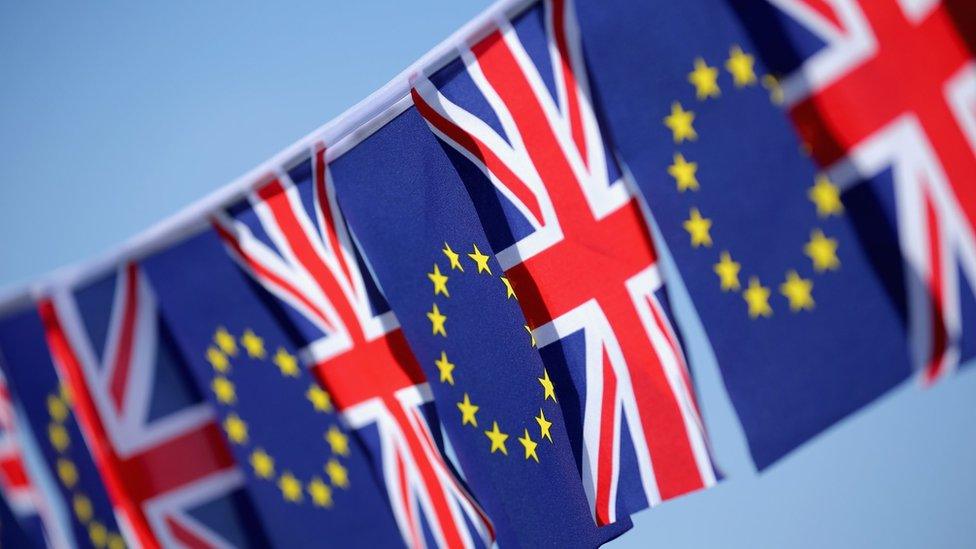Brexit: bulls, bears and bulldogs
- Published

There's a mis-match between Scotland's economic performance so far this year, and the gathering gloom about the potential impact of Brexit.
In 2016, the economy actually contracted, according to official statistics. It wasn't technically a recession, but it was a very poor year.
The start of this year shows a growth spurt, yet other UK indicators through recent months are pointing to a slowdown in confidence, related to inflation and a whole lot of uncertainty.
The Fraser of Allander Institute, at Strathclyde University, has an update today on its regular analysis and forecast, which seeks to figure out how these apparently conflicting trends fit together.
The assessment of the 0.7% growth figure for the first three months of the year, when the expectation was of being at, or close to, zero, brings some health warnings about the numbers.

It is notable, for instance, for being focused on only three sectors - refined chemicals and pharmaceuticals, metals and machinery and "other manufacturing, repair and installation".
Together, they represent only 6% of the entire Scottish economy, say the Allander economists. It's not obvious why they should have grown so quickly last winter. But if the figures are to be trusted, there may have been one-off factors that won't carry through until subsequent quarters.
Also worth noting is that the net growth in demand appears to have been entirely derived from the rest of the UK and not from Scotland.
Looking on the bright side, "the hope is that this bounce back will act as a catalyst for momentum to build across the wider economy through the remainder of 2017".
That includes the need to turn around a sharp decline in business investment, down nearly 8% in a year, and 3.4% in the first quarter.
Anaemic growth
The Fraser of Allander forecast for an anaemic 1.2% growth this year is based on a deal being done on Brexit. But without a deal, it's in line with almost all other economists in warning that things could turn out very much worse.
And there's a further warning that if the uncertainty continues, then business bosses will choose to plan on the basis of a bad outcome.
That's already happening in the finance sector. Industry sources expect decisions on more jobs being relocated into the rest of the EU during this winter.
Without the distribution of powers to Westminster and Holyrood, the opportunity to work with governments for an optimal outcome is being lost, says the Strathclyde report.
The UK government had anticipated that British industry would readily sign up to a jingoistic message of national unity in backing the Brexit Bulldogs as they go into battle with Johnnie Foreigner. That's not happening.
Sharp relief
So what is happening? Well, here is an example of the way business is thinking - not economists, many of whom find the whole Brexit process an interesting laboratory to test trade theory, possibly to destruction.
This is what Bank of America Merrill Lynch Global Research found when it sought the outlook from a range of equity analysts, for whom this is far from theoretical.
They looked at what would happen if there's no deal. "While extreme," writes the research note, "exploring this tail risk brings the challenges facing post-Brexit Britain into sharp relief.
Nine things they think investors should know:
It's become harder to broker shares listed in the UK, especially to international investors
A "bonfire"' of red tape is hard to envisage
Onerous changes to ownership rules, post-Brexit could stifle mergers and acquisitions activity
Growth and consumer confidence is being "propped up" by Bank of England policies, notably the low interest rate
If there's a fall-back to World Trade Organisation (WTO) rules, the economic fallout is dependent on "the kindness of strangers" (Britain gets deals only if others want them, and they may not be in a rush)
There's already a disconnect between stocks listed in London and the performance of the UK economy. That could widen further
Net outward migration post-Brexit "is a major risk for companies"
Some sectors would not be badly affected by a WTO outcome, such as mining stocks, which are highly international. Airlines, however, are highly dependent on open skies policies, which could stop abruptly
The good news for investors: for now, other factors around global demand and sectoral performance, drive the pricing of the stock market, rather than Brexit
Basic resources
The risk most often identified by analysts, according to this report, is of reversing the high levels of immigration in recent years.
If foreign workers are blocked or discouraged from Britain, if earnings in sterling are less attractive and growth is slowed, the population could come in as much as one million below forecasts.
If you're investing in housebuilders, banks, insurance, retail, media and leisure, that risk is not yet being priced in.
If you think the Brexit talks will go well, this research note points to interest rates going up, the pound strengthening, and stronger prospects for real estate, media and retail.
For those who are bearish on the outcome of Brexit talks, the advice is to invest in basic resources, oil majors, consumer staples and healthcare. There may be quite a big demand for painkillers.